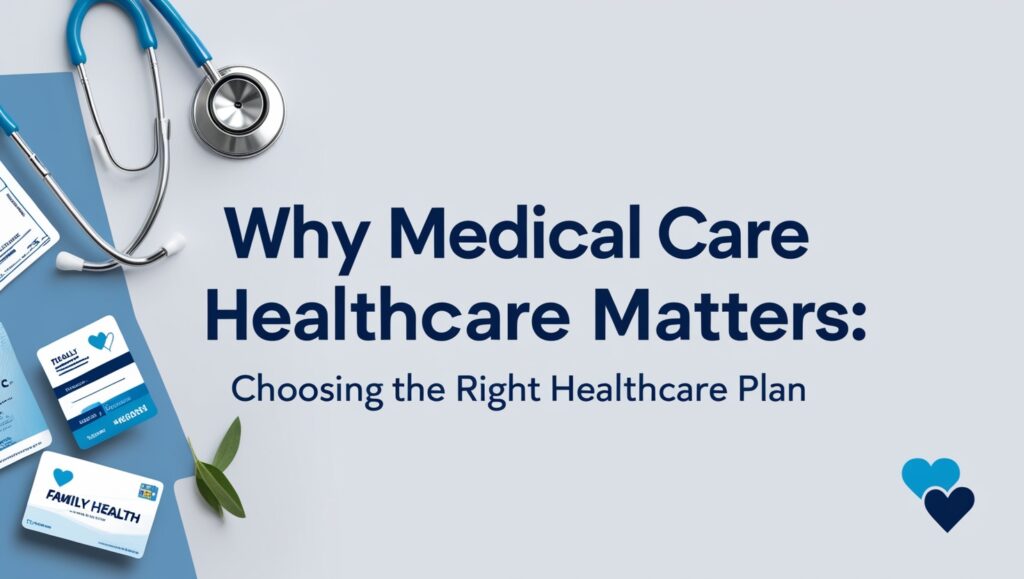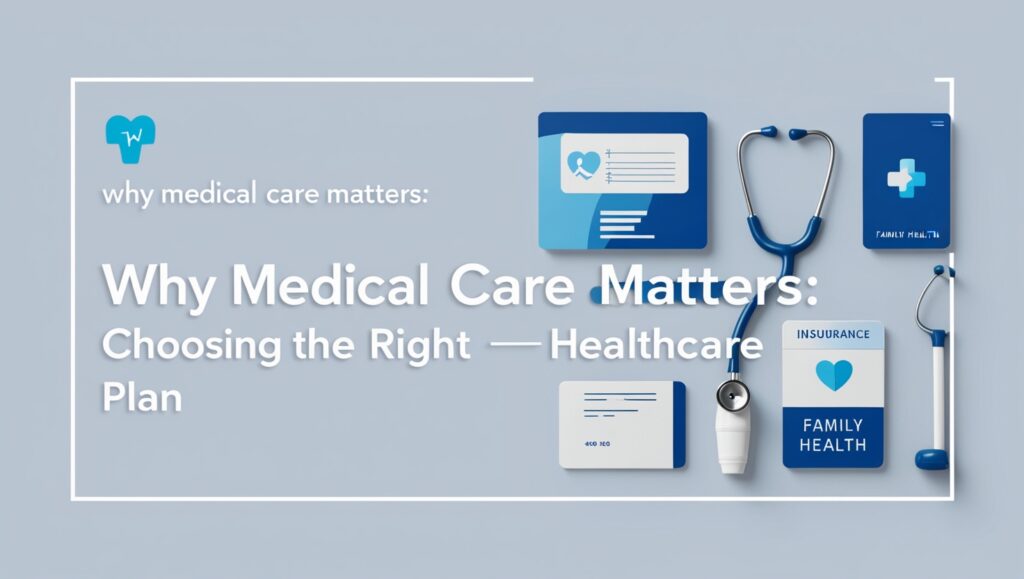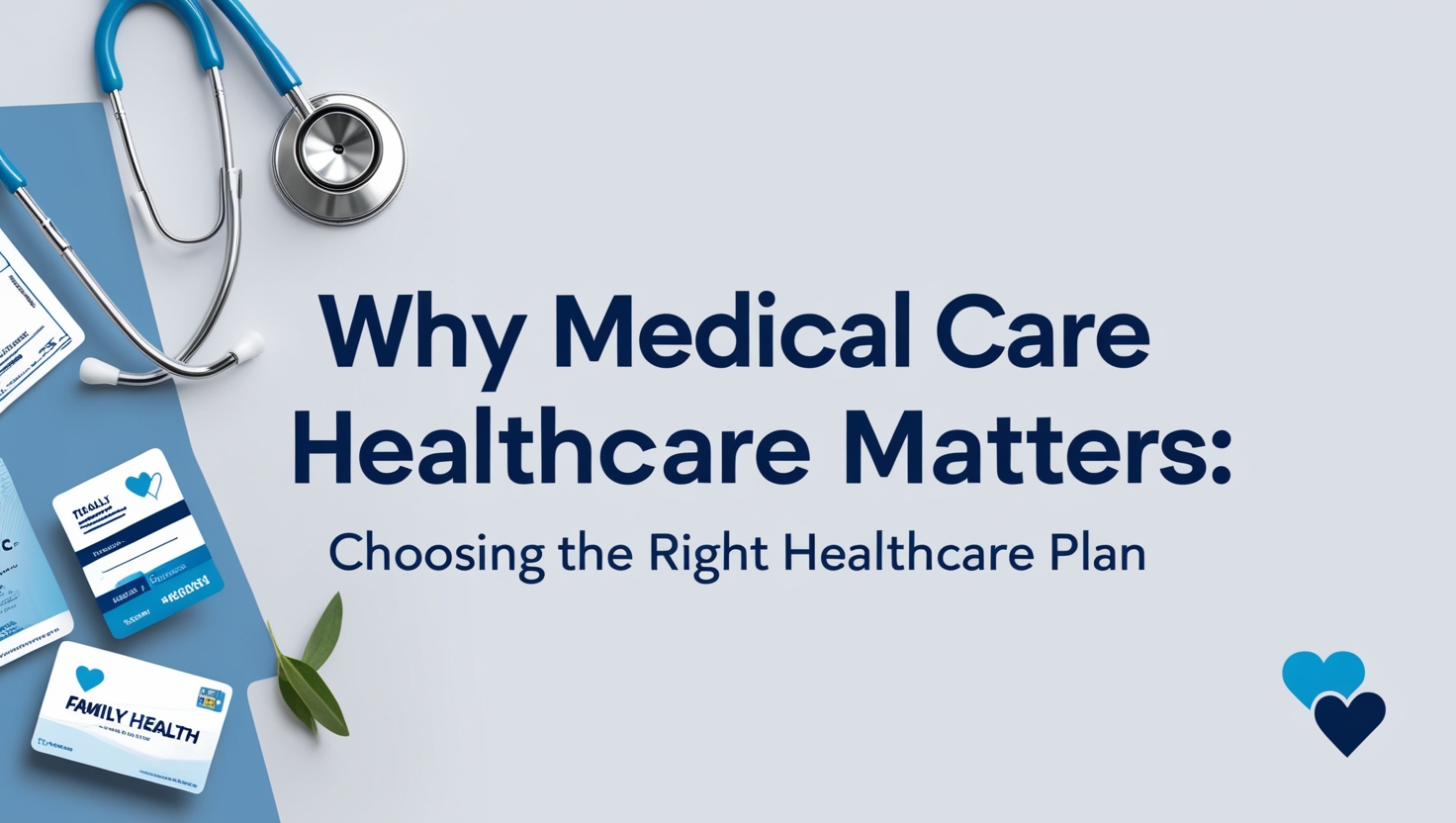Introduction
In today’s fast-paced world, where health challenges can arise unexpectedly, medical care matters more than ever. From managing chronic conditions to ensuring preventive measures, having access to the right healthcare can significantly impact your quality of life. But navigating the complex landscape of healthcare options can be daunting.
Why does medical care hold such importance? It’s not just about treating illnesses—it’s about safeguarding your future, protecting your family, and securing peace of mind. Whether you’re choosing a healthcare plan for the first time or reassessing your options, making the right choice can save you both time and money in the long run.
In this article, we’ll explore why medical care matters and how to choose a healthcare plan that fits your needs. By understanding the key factors, comparing options, and avoiding common pitfalls, you’ll be better equipped to make informed decisions about your health.

Table of Contents
The Importance of Medical Care
What is Medical Care?
Medical care refers to the services provided by healthcare professionals to maintain, improve, or restore health. It encompasses a wide range of services including preventive, diagnostic, and curative treatments aimed at keeping individuals healthy and managing diseases when they occur.
Preventive services focus on preventing health problems before they start. These include vaccinations, health screenings, and lifestyle counseling. For instance, getting vaccinated against flu or having regular cholesterol checks are examples of preventive measures that can help detect problems early and prevent serious diseases from developing.
Diagnostic services are essential for identifying health issues through tests, imaging, and consultations. Blood tests, MRI scans, and X-rays are examples of diagnostic tools that help physicians detect diseases early, even before symptoms appear.
Finally, curative services focus on the treatment of illnesses once diagnosed. This includes surgical procedures, chemotherapy, and pharmaceutical interventions. A curative approach is necessary when diseases or conditions are already present, aiming to treat or manage them effectively.
Why Medical Care Matters
Enhances Quality of Life and Longevity
The right medical care can significantly enhance one’s quality of life. Regular check-ups, early interventions, and access to medical expertise can lead to early diagnosis, proper treatment, and better management of chronic conditions. When individuals have access to effective healthcare, they are better equipped to lead longer, healthier lives.
Reduces the Risks of Untreated Conditions
Untreated medical conditions can escalate into serious and potentially life-threatening problems. Regular medical care helps to monitor and manage existing conditions like diabetes, hypertension, or asthma, preventing them from worsening and leading to complications.
Supports Mental and Physical Health
Medical care also contributes to mental well-being. Access to mental health services, such as counseling or therapy, is essential for managing mental health issues like anxiety and depression. When people are not burdened by untreated health problems, they can experience more emotional stability and better physical health.
Statistics on the Importance of Medical Care
A report from the World Health Organization (WHO) shows that access to quality healthcare can increase life expectancy by up to 30 years in certain regions. Furthermore, early diagnosis of diseases like cancer, diabetes, and cardiovascular diseases can reduce mortality rates by up to 50%. These statistics highlight just how vital medical care is in promoting a long and healthy life.

Understanding Healthcare Plans
Types of Healthcare Plans
Choosing the right healthcare plan is essential, but before you can choose, it’s important to understand the various types of plans available:
Health Maintenance Organizations (HMO):
HMO plans are usually more affordable, as they require members to use a network of doctors and hospitals. To access specialists or certain services, members often need a referral from their primary care physician. This plan is ideal for those who prefer a structured, cost-effective approach.
Preferred Provider Organizations (PPO):
PPO plans provide more flexibility by allowing you to see any healthcare provider, but you will pay less if you stay within the network. While these plans tend to have higher premiums than HMO plans, they offer more freedom in choosing providers.
Exclusive Provider Organizations (EPO):
EPO plans combine features of both HMO and PPO plans. They offer the flexibility of a PPO, but with more limited provider networks. There are no out-of-network benefits unless it’s an emergency, which makes it ideal for those who want more control over their healthcare but are okay with fewer options.
Indemnity Plans:
These plans offer the most flexibility, allowing you to choose any healthcare provider without the need for a referral. They often come with higher premiums and out-of-pocket costs but give the most freedom for those who travel often or prefer specific doctors.
Factors to Consider When Choosing a Plan
When selecting a healthcare plan, there are several factors to take into account:
Coverage Details:
What’s included in your plan is crucial. Ensure that essential services like routine check-ups, specialist visits, hospitalization, and emergency services are covered. Some plans may not include mental health services or dental care, so review the coverage thoroughly.
Premiums, Deductibles, and Copayments:
The upfront premium is only one cost you’ll pay. Deductibles are the amount you must pay out-of-pocket before your insurance kicks in, and copayments are the share of costs you pay each time you receive a service. Balance these costs with your budget to find the right plan.
Network Restrictions and Flexibility:
Some plans limit your access to a network of doctors and hospitals. Be sure to check if your preferred providers are included in the network. If you travel often, you might prefer a PPO or indemnity plan, which offers more flexibility.
Common Mistakes When Choosing a Plan
Many individuals make the mistake of choosing a plan based solely on the monthly premium without considering the total cost of care. Common mistakes include:
- Not Checking In-Network Providers: Failing to verify if your current doctors are in-network can result in unexpected medical bills.
- Overlooking Prescription Drug Coverage: Ensure that the plan covers your necessary medications, as this can save you substantial costs.
- Focusing Only on Low Premiums: While low premiums may seem appealing, they often come with high deductibles and limited coverage. Make sure to balance costs with comprehensive coverage.
Tips for Choosing the Right Healthcare Plan
Selecting the right healthcare plan is a personal decision. Here are some tips to guide you:
Assess Your Medical Needs:
Consider your current health status, family size, and medical history. If you have a pre-existing condition, look for plans that offer comprehensive coverage for ongoing treatments.
Compare Plans:
Use online tools to compare plans based on coverage, premiums, and customer reviews. You can also seek guidance from an insurance agent or medical professional.
Consult with Experts:
Speak with medical professionals or insurance agents who can help you understand the specifics of each plan and how it relates to your medical needs.
Balance Cost and Coverage:
Look for a plan that balances affordability with adequate coverage for your needs. It’s important to ensure that the plan covers necessary services without costing too much upfront.
Quick Checklist:
- Does the plan cover regular doctor visits and emergencies?
- Are there provisions for accessing specialists?
- Does the plan include preventive care like vaccinations and screenings?
Benefits of Having the Right Medical Care Plan
The right medical care plan provides several key benefits:
Financial Security in Emergencies:
With the right plan, you’re protected from exorbitant medical costs during emergencies or unexpected health events. A comprehensive plan can reduce out-of-pocket expenses and prevent financial strain.
Access to Better Medical Facilities:
Quality healthcare plans give you access to top hospitals, specialists, and healthcare professionals, ensuring you receive the best possible care.
Stress Reduction with Organized Care:
Knowing that you have a reliable healthcare plan in place alleviates stress, especially during health crises. An organized plan helps manage appointments, prescriptions, and treatments.
Long-Term Savings:
By selecting the right plan, you’ll save on future healthcare costs, preventing out-of-pocket expenses for major medical conditions. A well-rounded plan provides both immediate and long-term value.
Take control of your health today by choosing the right healthcare plan for you and your family. Explore resources and tools to compare different options and find a plan that meets your needs. Remember, your health is worth the investment.
Conclusion
In conclusion, medical care matters because it’s a fundamental pillar of a long, healthy, and fulfilling life. By choosing the right healthcare plan, you ensure that you and your loved ones are supported in both sickness and health. Prioritize your health today, and make informed decisions to safeguard your future well-being.
Remember: Your health is your greatest asset—treat it with the care it deserves.
FAQs ( Frequently Asked Question )
Why is choosing the right healthcare plan so important?
Choosing the right healthcare plan ensures you receive the necessary medical services while minimizing out-of-pocket costs. The right plan aligns with your health needs, budget, and future goals, providing peace of mind in the event of illness or emergencies.
What should I look for in a healthcare plan?
When selecting a healthcare plan, consider the following:
Coverage Options: Ensure it covers essential services, including preventive care, emergency services, and prescription medications.
Network of Providers: Check if your preferred doctors, specialists, and hospitals are included in the network.
Cost: Understand the premiums, deductibles, and out-of-pocket maximums to avoid surprises later.
Prescription Coverage: Make sure the plan includes coverage for necessary medications.
Customer Support: Choose a plan with reliable customer service to assist with questions and claims.









